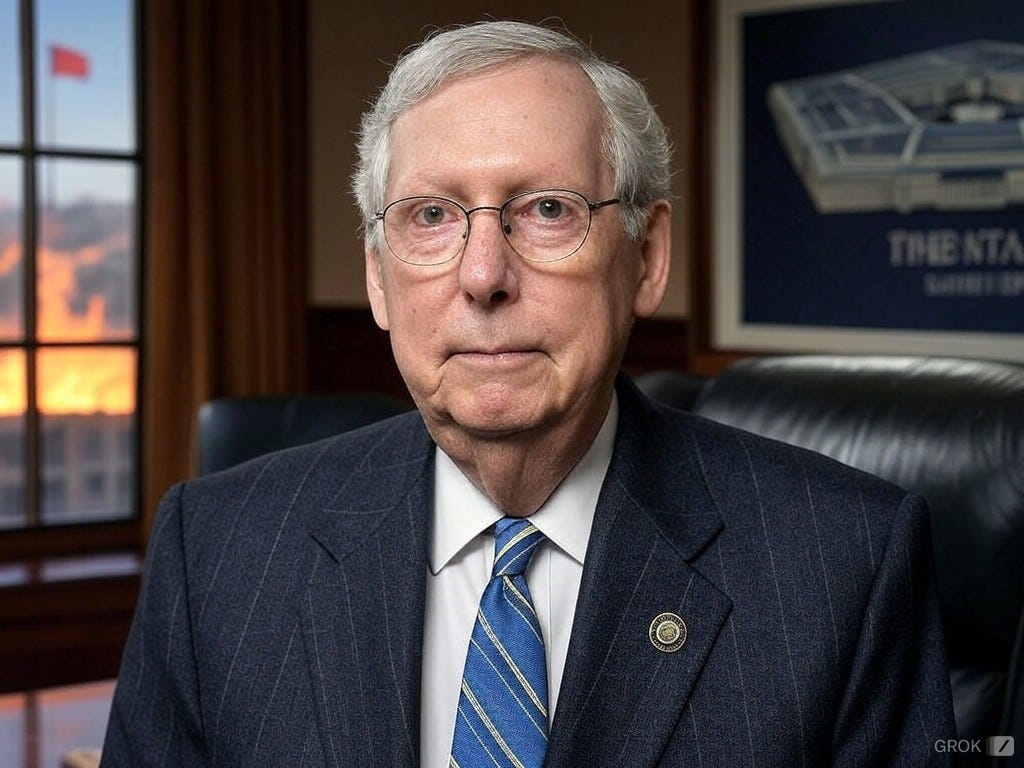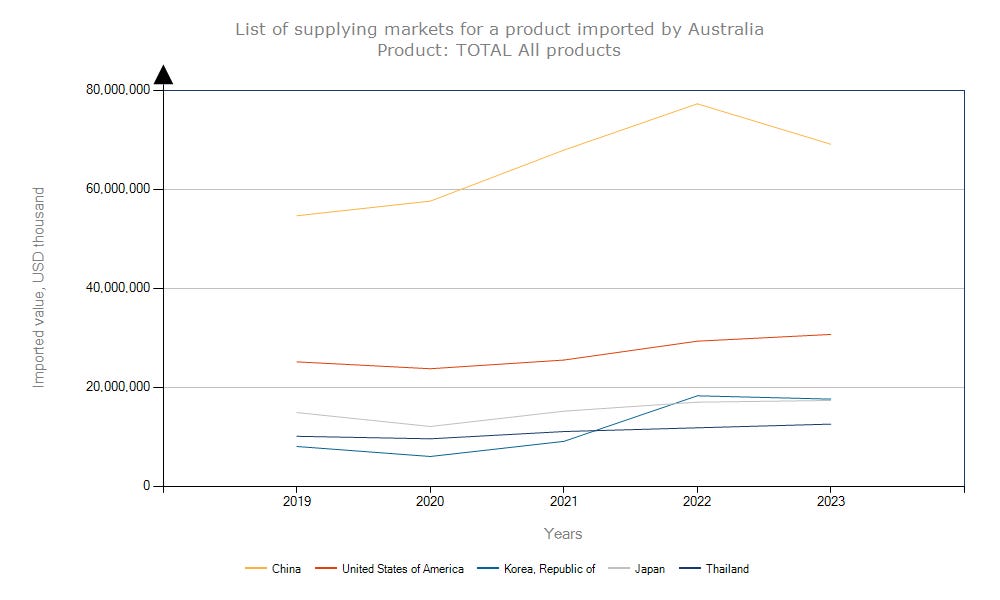Sen. McConnell Tries Taking Over China Story. Why It's a Terrible Idea.
Trump needs to assert that the China story is an economic security story, not a national security story preferred by the usual DC players.

Sen. Mitch McConnell is trying to set the tone on foreign policy under Trump in his op-ed in Foreign Affairs magazine, published today in the January/February 2025 print edition. Call it a warning. Here is his take online bemoaning Trump’s “protectionism” and “isolationism”. These are dirty words in the Imperial Capitol.
Foreign Affairs is the "think tank" publication for the A-list in Western foreign policy circles. Their thinking is outward in nature, and less concerned about the homeland.
In the op-ed, you will see that McConnell uses fear of China as the reason to remain focused on corporate globalism, with a heavy dose of spy and war gaming in China's backyard. Not to do so is isolationist and protectionist, he says.
McConnell is the elder statesman of the foreign policy powers. This includes private interests — interests that run the gambit from weapons systems manufacturers to Western idealogues and influential donors aching to fight the last war. His message is meant to turn the China story from one about gutting American industry into a story that is favorable to the "sexier" topics preferred by many elected officials and foreign policy operators.
Trump should not let China become another regime change story. His team should focus on the commerce side of the China relationship, not the national security side.
The national security side may seem easy to incorporate into economic security, but it is not. In Washington, national security is very clearly aligned with things related to political control (legislation and policy of domestic and foreign population's comings and goings in the US, for example.), technologies used to control those populations (such as facial recognition or maybe optical equipment to track people's movements), cyber warfare, bio-warfare, and of course weapons procurement of any size, from Anduril drones to Raytheon’s newer PAC-2 GEM-T Patriot missiles. Unless you are building a widget for that, and that's your core business, you’re of less interest to Washington lawmakers. And if you do make those things, so what, because, “we can get it from Mexico and the Philippines. The situation is urgent and we need it now and we need it cheap and you're too expensive, and there's no time to waste.” You can try to change their minds, but it will be harder if they are singularly focused on NatSec.
Think of NatSec as business as usual. The post-globalist movements, emblematic in the rise of right (and left) wing national populism, have rejected business as usual time and time again.
Under this framing on China, American companies that are not defense-minded are less likely to get a serious hearing from their elected officials unless they can frame their trade concerns into something some high-end defense contractors want or into something supportive of State Department interests abroad. We need to move beyond this way of thinking.
In the best case, Trump’s economic team and defense team can make the case that national security is economic security. His team should try to do that and not let what many now know as “the foreign policy blob” define the narrative with stories of interest to the defense and intelligence establishment.

Already in hearings on China on Capitol Hill, the defense narrative is paramount, as if China is the new ISIS and Soviet Union combined.
The solution to keeping a lock on China is always to embrace globalism by forming free trade blocs in Asia. Taken deeper, it is seen as a way to weaken Chinese soft power and corporate power in China’s backyard, and to stop its military from being a sales force in the region. They don’t want the Indians buying Sukhois from Russia and J-35s from China, too. That’s a blow to market share. (Pakistan is a U.S. ally and buyer of Chinese fighter planes.)
Sen. McConnell supported Obama's "anti-China" Trans Pacific Partnership (TPP) free trade agreement, an agreement that would have turned countries like Vietnam into an even bigger hub of Chinese multinationals than it already is. In fact, Chinese multinationals probably began moving to Vietnam thinking TPP was going to pass one day. Trump put it out of its misery in 2017, but Vietnam is still a huge source of imports by Chinese multinationals today. We have a $10 billion trade deficit with them, one of our biggest.
I don’t know if McConnell thinks TPP-style trade deals will block member countries from doing business with China. If the USMCA isn’t stopping China’s record number of investments in Mexico, who are we to say the TPP would have?
Moreover, none of the 12 countries in the old and dead TPP need a free trade deal with the U.S. They have around 3.5% tariffs to sell their goods here as it is, and most of them all have huge surpluses with us. Instead of dealing with one giant, we would still have China to contend with (as now) plus a half dozen mini-China's added to the roster thanks to the TPP.
If They Hate Us So Much, Why Are They Giving Us A Billion Dollars?
Sen. McConnell wants you to think that our allies are very disappointed and angry with us because we are "protectionist" and Trump wants to be isolationist. That’s what he writes in Foreign Affairs magazine.
Seven examples that spring to mind:
In 2019, Singapore Technologies Engineering spent $506 million to buy MRA Systems in the U.S., a defense technology company. In 2017, they spent around $4 billion to buy Pittsburgh based autonomous robotics firm Atheon. They build R2-D2s for the hospitality and healthcare industries.
Japan is the biggest TPP economy. One of their biggest corporations, Fujitsu, has been expanding its HVAC manufacturing in New Jersey since 2018. If they had a free trade deal with the U.S., their would be no need to make some of the smaller units as they are easier to ship and the yen is worth pennies on the dollar.
In 2022, Panasonic announced it will be building an EV battery-making plant in Kansas.
Toyota will invest $8 billion in EV battery production in North Carolina, the Biden administration announced on April 10, 2024.
Chile’s SQM, one of the biggest lithium miners in the world, has a venture capital wing. They invested $3 million last year in Seattle-based start-up Electric Era, an EV charging and battery storage manufacturer.
In 2022, Australian pharmaceutical company CSL announced it was expanding in Holly Springs, North Carolina, adding 80 skilled jobs and increasing production of medicines like flu vaccines.
In February 2024, Australian mining company Orica said it would acquire chemical company Cyanco Intermediate 4 Corp for $640 million to expand its geographical reach in mining chemicals business. Cyanco produces sodium cyanide, a chemical required for gold processing, at its Nevada and Texas plants.
We have a free trade agreement with the Koreans. But they still buy more from China than from us. China is their next-door neighbor. And, like here, they have pricing power and advantages.



China is an economic rival the U.S. will struggle to compete with due to its price-setting ability on a lot of key items like steel and solar; it is also a corporate rival in Asia, a market long coveted by the West and long ruled by Western brands. China goes toe to toe with them now.
If the U.S. wants an industry, it will have to figure out ways to grow that industry here. That’s the debate, with much of it leaning towards the new bipartisan consensus on trade that believes tariffs can stop the bloodletting (or be a source of revenue, another tack with a different goal).
More has to be done to compete with China. But turning China into a military threat that convinces Trump to throw more money at defense contractors and ignore the interests of the homeland plebs in favor of an imperial project Christmas list will be a lost opportunity to compete with China economically.





